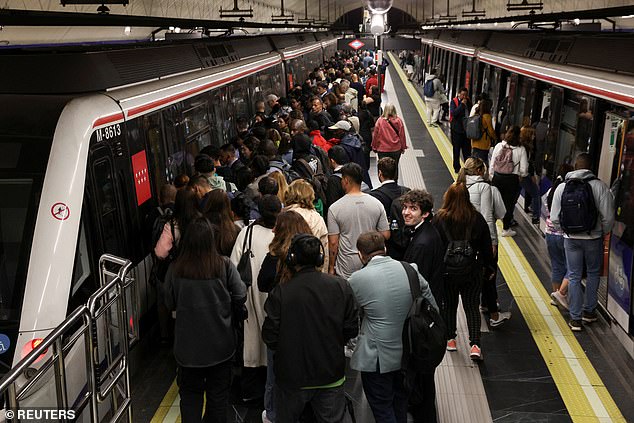Thousands of rail passengers in Spain have faced delays after copper cables used in the signalling system of a high-speed line travelling south from Madrid to Seville were stolen at five locations, authorities said.
The theft, which happened late Sunday, affected dozens of trains travelling between Madrid and the southern Andalusian cities of Seville, Malaga and Granada as many people were returning home to Spain’s capital after a holiday weekend.
Copper prices are high on global markets, meaning criminals stand to collect big sums of cash from selling the material.
Transport minister Oscar Puente said in an X post that he expected the rail line would fully return to its normal schedule by 4pm local time.
Many travellers crowded Madrid’s Atocha station on Monday seeking information about their trains from rail employees and screens with updated departure times.
By 9am, Alberto Valero and his family had spent hours at the station because of delays on services to Seville, where they were headed. Mr Valero was on holiday in Spain from Mexico, and expressed frustration about the lack of information.
‘We’re here with tourists from everywhere – France, Portugal,’ Mr Valero said. ‘Everyone is at a loss for what to do because of the total disarray.’
The cable theft took place at five points on the high-speed line in Toledo in central Spain, Mr Puente said on X, adding that Spain’s national police force was investigating the incident.

People board metros as the metro operations resume partially, after power begins to return following a huge outage that hit Spain and Portugal, in Madrid, Spain April 29, 2025

Travelers sit as they prepare to spend the night at the Atocha train station, following a massive power cut affecting the entire Iberian peninsula and the south of France, in Madrid on April 28, 2025

Travelers pull their luggage as they arrive to spend the night at the Atocha train station, following a massive power cut affecting the entire Iberian peninsula and the south of France, in Madrid on April 28, 2025
Spain’s high-speed rail network has expanded rapidly and travels through large stretches of the country’s little-populated countryside.
The incident came a week after a blackout in Spain and Portugal saw high-speed train traffic in Spain ground to a halt, stranding many passengers for several hours.
Described as ‘catastrophically bad’, the outage grounded flights, sent roads into gridlock as traffic lights failed, and left entire cities without power or telecommunications.
A British holidaymaker was forced to give birth to a premature baby in the garden of a Costa del Sol hotel during the outage.
The tourist sought help from a receptionist after her waters broke. The hotel worker tried to call a taxi – but ended up helping her give birth and even practiced CPR on the new-born baby who didn’t have a pulse.
The drama happened at the Puente Real Hotel in Torremolinos. The unnamed British tourist was rushed to hospital after emergency medical responders reached the hotel and took her away in an ambulance with a police escort.
She was 30 weeks pregnant when she went into labour. The baby was said to be in a ‘critical’ condition this morning.
The outage caused a frenzy across the Spain, with the interior ministry deploying 30,000 police officers countrywide to maintain security in an evening of darkness.
Huge queues formed outside shops and banks as residents, with tourists desperately seeking to stockpile essentials and take out cash.

Stranded train passengers spend the night at Atocha railway amid a massive power outage that affected Spain and Portugal, in Madrid, Spain, late 28 April 2025

Sants train station evacuated after a widespread power outage strikes Spain and Portugal around midday Monday while the causes are still unknown in Barcelona, Spain on April 28, 2025

Passengers wait for Barcelona Sants railway station to reopen amid a power outage, in Barcelona, Spain, 28 April 2025
Rows of cars were pictured lining up at petrol stations as people hoped to fill up their vehicles and fuel cans, with expats detailing how they have tried to power generators to keep their homes going.
The partly state-owned grid operator’s chief of operations told reporters last week that grid instability caused the Spanish and French electricity interconnection through the Pyrenees mountains to split, resulting in a general collapse of the Spanish system.
Sanchez said that the country had lost 15GW of electricity generation in five seconds – equivalent to 60 per cent of national demand – and later thanked France and Morocco for providing Spain with power.
While the exact cause remains unclear, REN, Portugal’s grid operator, said they believed a ‘rare atmospheric phenomenon’ was behind the outages.
Experts say the blackout is likely due to a combination of factors including Spain’s reliance on green energy and ‘anomalous oscillations’ in power lines.
While authorities say that a cyberattack is not likely, the possibility of malicious interference has not yet been ruled out.
This article was originally published by a www.dailymail.co.uk . Read the Original article here. .

